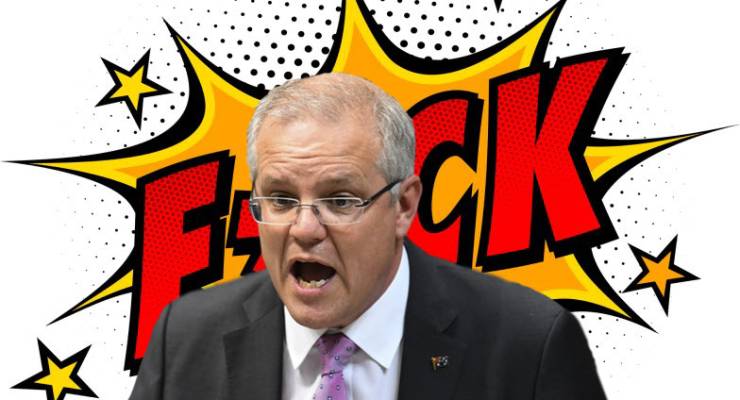
A Tasmanian man named Allan Maccaul copped a $500 fine this week after he shouted “you’re a fucking muppet, you’re a fucking muppet” at Prime Minister Scott Morrison, at the Bathurst 1000 in early October. But wait, in the land where we apparently laud the larrikin, calling the PM a fucking muppet (hell, 50% of that description comes from Morrison himself) gets you set upon by the Protection Operations Unit?
The history
The first laws against offensive language emerged in New South Wales in the early 1800s. They were penal ordinances which applied only to convicts, and could be used to punish them with brutal lashings for talking out of turn to their superiors. By 1849, comprehensive obscene and indecent language laws were enacted in NSW, and soon they spread across the colonies.
The law around “offensive behaviour”
Now, “offensive conduct” is a criminal offence in all Australian states and territories, although the exact definition varies between jurisdictions, and only the Australian Capital Territory doesn’t explicitly contain a language offence. Generally, the laws will prohibit “offensive, obscene, indecent, riotous, disorderly, violent, threatening and/or abusive language and behaviour”.
Further complicating the matter is the level of interpretation at play. A judge has to decide whether the behaviour is “calculated to wound the feelings and arouse anger, disgust or outrage in the mind of a reasonable person”.
Didn’t that guy get away with calling Tony Abbott a “cunt” that one time?
Yep. Well, kind of. Anti-corruption campaigner, former councillor and bright-eyed eccentric Danny Lim had his charge of offensive behaviour eventually overturned. Lim had been charged for wearing a sign which read: “PEOPLE CAN CHANGE/TONY YOU CⱯN’T/LIAR, HEARTLESS, CRUEL/PEACE BE WITH YOU”. In addition to being upside down, the “A” was rounded to make it look more like a “U”.
As it turns out, partly because of the “A” and the apostrophe, the judge ruled that Lim hadn’t “unequivocally” used the word “cunt”. But he also made a broader point about Australia’s generally robust use of language, freedom of speech and what a politician can expect as opposed to an average citizen.
This is an essential and accepted part of any democracy. That criticism can often extend to personal denigration or perhaps even ridicule, but still maintain its essential character as political comment.
There is no reason to conclude that the prime minister, as the leader of the federal government, should be treated any differently to any other person who holds or seeks political office.
A trio of Community Action Against Homophobia activists who chanted that Fred Nile should “fuck off” at a protest were cleared under similar reasoning in 2016.
So why then is Morrison being treated any differently?
Criminalising certain groups
There is a huge amount of discretion afforded to police about who they charge with offensive language — an officer can decide to simply ignore public bad language, issue a caution or issue an on-the-spot fine. It has been noted time and time again that Indigenous Australians are grossly over-represented among those charged with offensive language; indeed the Australian Law Reform Commission report on Indigenous incarceration recommended narrowing the laws, or repealing them altogether.
Further, as Elyse Methven pointed out in The Conversation, getting such a charge overturned requires resources and nerve. According to reports of Maccaul’s case, Maccaul — who referred to Morrison as “the premier” during the incident and had a small amount of cannabis and LSD in his backpack at the time, for which he was fined a further $800 — “did not appear to answer the charges against him”.








Crikey is committed to hosting lively discussions. Help us keep the conversation useful, interesting and welcoming. We aim to publish comments quickly in the interest of promoting robust conversation, but we’re a small team and we deploy filters to protect against legal risk. Occasionally your comment may be held up while we review, but we’re working as fast as we can to keep the conversation rolling.
The Crikey comment section is members-only content. Please subscribe to leave a comment.
The Crikey comment section is members-only content. Please login to leave a comment.